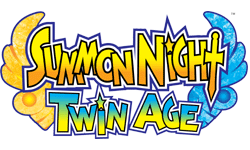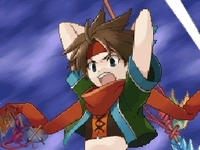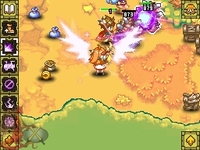|
|

|
PLATFORM
|
DS
|
BATTLE SYSTEM
|

|
INTERACTION
|

|
ORIGINALITY
|

|
STORY
|

|
MUSIC & SOUND
|

|
VISUALS
|

|
CHALLENGE
|
Very Easy
|
LENGTH
|
Less than 20 Hours
|
|
OVERALL

|
+ Simple, easy combat
+ Great ally A.I.
+ Variety of skills
- Little challenge
- Really short
- Shallow story
|
Click here for scoring definitions
|
|
|
Summon Night: Twin Age is part of Banpresto's long-running Japanese RPG series consisting of nine unique games. Of those nine, Twin Age is the third to be released in North America thanks to Atlus, following the first and second Summon Night: Swordcraft Story titles for the Game Boy Advance. Like other games in the series, Twin Age features a duo of protagonists: one male and one female. Reiha is a human girl with the power to summon creatures. She was raised on the isolated island of Marbado alongside beastlike creatures known as Kascuza. Joining her on this island is Aldo, a young boy that Reiha treats as if he's her own brother, though he's actually a Summon Beast brought forth by Reiha in an accident where she lost control of her powers. And so seven years later on this island is where Reiha and Aldo begin their adventure of semi-sibling love and friendship.
As Reiha and Aldo set forth to their coming of age ceremony, they are distracted as the world's elemental spirits become unstable and start causing unnatural events to occur in the world. The two decide to postpone the ceremony and venture off to find the source of the problem. Before too long, the duo meet up with a couple of their beastly Kascuza friends and set off to explore the dangerous and prejudice human lands. Thoughout their adventure, Aldo and Reiha learn more about their past and the truth behind the events from seven year prior. Though the story starts off really shallow and secondary, by the end of the game, the player should find the light-hearted cast of characters to be a likeable bunch.
 HEY!!
HEY!!
|
|
Where both Swordcraft Story games were action RPGs in the vain of the Tales series, Twin Age does its battle system completely different. Replacing random encounters is a touch-screen focused real-time combat system. As players enter an area, they are given control of either Aldo or Reiha and can swap between the two with a simple tap at the top of the screen. Combat is even easier. Want to attack an enemy? Just tap it and whichever member of the dynamic duo is selected will start attacking. Using skills is simple as well; players will just need to tap the skill icon on the side of the screen and then tap the desired target. To assist with keeping track of the large amount of skills available, as soon as the skill is selected the top screen will display details about what the skill does.
Aldo and Reiha each have their own unique combat focus; Reiha is a magic-user and Aldo focuses on direct melee combat. This diversity makes for a great game dynamic as the combat A.I. for the party member not in direct control is rather intelligent. If players want to get into the heat of the action with Aldo, Reiha will heal him, buff the party, and restore her own skill points when low. She will also use any other skills that she has been assigned fairly adeptly, such as sleeping a group of overwhelming enemies or sealing off their ability to use special skills. Along with Aldo and Reiha, players will have a third non-controllable party member assisting them during most chapters. Each of these selectable allies has their own methods of assisting the party. Some will act on their own, others will fight whatever the main characters are fighting, and some will protect the party even at the cost of their own life. When a character dies in battle, they will automatically revive after a certain amount of time has passed. Along with the three party members, players can choose to create and then summon optional beasts as well. Even though the A.I. handles combat fairly well, it would still have been nice to be able to customize NPC actions.
Progression takes place via an overworld map and the areas found within it. New areas become available as the story progresses with old areas being available even after they've been cleared. Players can either progress directly through the storyline or they can backtrack and explore in order to gather ingredients to craft powerful items or to simply gain experience. If players merely explore the current available story area completely, most of the time there is no need to backtrack for items as recipes are parsed out as the story goes forward.
 Tap That Screen
Tap That Screen
|
|
Summon Night: Twin Age is a fairly well-presented RPG, especially visually. Character sprites are fairly well detailed for use on the small DS screen, and the dialogue portraits are large and offer a variety of facial expressions for each character. Sadly, many areas and enemies are merely palette swaps of each other, but even though that creates a lack of variety, the quality of detail is still present. The soundtrack offers some fairly pleasant tracks, even if most of it is little more than ambient noise. What little voice acting offered in Twin Age is laughable; featuring one line introductions and one word interjections. That aside, most of the game's presentation is very solid.
In the area of challenge, Twin Age does not put up much of a fight. The straightforward combat and helpful A.I. make for a very easy playthrough with only bosses offering any true challenge. Controlling Reiha during boss fights to optimize healing is an ideal strategy for most bosses, as Aldo is more than capable of hacking away without player assistance. Not only is Twin Age easy; it's short, lasting between ten to fifteen hours for a single playthrough. Some optional side quests can boost this time somewhat, but most of these fetch quests are pointless and do not benefit the player enough to make it worth the time.
Overall, Summon Night: Twin Age is a very solid game with simple DS-focused gameplay and a light-hearted story. It offers very useful A.I. assistance and a ton of variety for combat. For many, it will be a little too easy and a little too short, but in the end it makes for a great introduction to the Summon Night series. For those that missed out on the Swordcraft Story titles, this is a great place to start, even if the experience is completely different.
Review Archives
|









